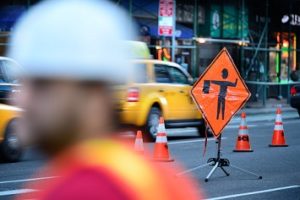The New York Committee for Occupational Safety and Health (NYCOSH) has released its latest construction fatality findings. “Deadly Skyline: An Annual Report on Construction Fatalities in New York State” cites “alarming increases in New York State construction fatalities.” The document also notes that “employers routinely violate legal regulations with impunity.”
Other findings:
- In 2016, New York State had a 60% higher construction fatality rate than New York City. Over the past 5 years, the city’s fatality rate in construction decreased by 21.3%, while the state rate increased by 29.5%.
- Non-union job sites are especially dangerous for workers. NYCOSH analyzed OSHA’s 36 investigated construction fatality citations in 2016 and found that in New York State, 94.7% of workers who died on private worksites were non-union. In the city, that figure was 93.8%.
- Falls continue to be the top cause of construction fatalities in New York State and New York City. Over the past decade statewide 218 workers died in falls, or 48% of all construction fatalities. In the city over the past 10 years, 101 workers died due to falls, or about 46% of all construction deaths.
- Enforcement agencies are drastically underfunded. NYCOSH conducted an in-depth analysis of inspections since OSHA’s founding and found “a staggering decrease in inspections over the past 20 years.”
- OSHA construction fines for fatality cases remain low. NYCOSH says that average OSHA fines in construction fatality cases decreased by 7%, to $20,217.
Among recommendations, the NYCOSH document lists:
- Require construction training and certification for New York State’s construction workers.
- Establish funding streams for construction safety training programs in New York City, especially to benefit low-wage, immigrant workers.
- Ensure corporate responsibility for worker fatalities.
- Expand criminal prosecutions statewide when failure to protect workers rises to the level of a criminal offense.
- Use existing city powers to suspend or revoke licenses and construction permits for criminal contractors.

